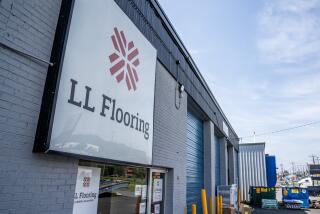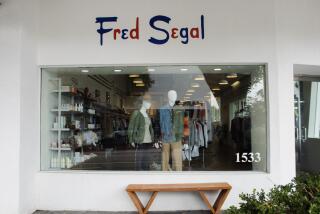Western Wear Chain Files for Bankruptcy
CANYON COUNTRY — Wounded by the waning popularity of western line dancing, a weak retail market and a shortage of Japanese tourists, a chain of cowboy clothing stores owned by U.S. Rep. Howard P. “Buck” McKeon (R-Santa Clarita) and his four brothers has filed for bankruptcy court protection.
Howard & Phil’s Western Wear, which grew from 40 stores in 1991 to 55 in California, Nevada and Utah in 1994, has had to close 12 stores in the past year and a half, said Tim McKeon, vice president of finance.
He projected this year’s sales at $26 million, down 32% from a peak of $38 million in 1991. He said the company has assets of about $10.2 million but debts of about $16.7 million.
The business was begun by the McKeon brothers’ parents in 1962 and rode the country-western craze in the ‘80s and early ‘90s, until a slackening of interest in line dancing and a soft retail environment generally reduced the demand for western wear, Tim McKeon said.
He said the chain was also hurt by the 1994 Northridge earthquake, which forced it to close some stores temporarily, and by a drop in tourist travel to Southern California. Most of its shops are in the Los Angeles region and did big business selling cowboy clothing to Japanese tourists, he said.
While Howard McKeon is the only brother who does not work full time in the family business, the congressman does serve as a walking advertisement for the firm. He shows up at formal events wearing cowboy boots with his tuxedo, and strides into the Capitol in boots made from everything from ostrich to anteater hide.
The Chapter 11 bankruptcy petition by Howard & Phil Enterprises Inc. was filed in Los Angeles on April 25, after the landlord at six malls where Howard & Phil’s shops are located, Macerich Management Co. of Santa Monica, sued Howard & Phil Enterprises for breach of contract.
Macerich had won the right to place a lien on about $1.5 million in Howard & Phil’s assets, which represents the amount of rent that Macerich alleges it is owed on one store in Antioch that Howard & Phil’s closed last winter.
“We couldn’t pay that judgment,” said Tim McKeon. “So we filed for Chapter 11.”
“Overexpansion is a common disease among retailers,” said Robert Kahn, a management consultant and publisher of the Retailing Today newsletter. “You have one or two operations, and you do above expectations in sales, and suddenly you think you have the magic answer.”
Plus, Kahn said, Howard & Phil’s had the added burdens of a depressed Southern California market and the fact that consumers regard cowboy boots and hats as nonessential purchases.
Boots are Howard & Phil’s biggest-selling items. But the chain is also known for its western-style shirts, such as a current favorite that depicts scenes of cowboys on horseback before sunset skies, as well as the ever-popular Stetson hats.
Howard & Phil’s is hoping to win rent concessions from the landlords of about five store sites, where the lease payments are based on the better business climate of the early ‘90s, Tim McKeon said. If the company receives no rent relief on those properties, it might close more stores, he said.
The company has also been pared down to “bare bones” through a cost-cutting program, he said, decreasing the number of employees, through attrition, from 400 to about 300.
And the firm is negotiating with its suppliers to resume the shipments that had slowed recently due to the financial problems.
“When I had a break, I had the chance to go out and visit a couple of stores,” said Buck McKeon. “They were just way down on inventory. I know they’re getting shipments now. As they increase inventory, I’m confident that sales will drastically improve.”
The McKeon family has given no thought to the possibility of selling the chain, Tim McKeon said. Brothers Joe, John and Monte are also top officers of the company, and some of their offspring work in the business or for a boot supplier that sells to Howard & Phil’s.
“We’re very confident that we are going to survive this,” he said. “It will be smaller than it was before and it will be leaner. We still feel there’s a tremendous future in western wear.”
More to Read
Inside the business of entertainment
The Wide Shot brings you news, analysis and insights on everything from streaming wars to production — and what it all means for the future.
You may occasionally receive promotional content from the Los Angeles Times.











